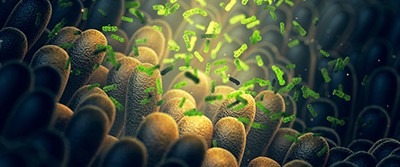A Potential Link Between Autism and Gut Bacteria

By Moira Bell
In a recent study, researchers discovered preliminary evidence potentially linking gut bacteria with autism.
Disorders on the autism spectrum seem to be related to genetics, but other factors may be involved. Prior studies have shown differences in the microbiomes of people with and without autism, but cause and effect are not clear. When colonized by microbes from the feces of people with autism, mice developed autism-like behaviors.
Gut Reaction
To test their theory, microbiologists at the California Institute of Technology (Caltech) in Pasadena put fecal samples in the stomachs of germ-free mice, some from children with autism and some from children without the disorder. They then mated the pairs of mice colonized with the same microbiomes to expose offspring to the set of human microbes early on in their development.
Utilizing a set of behavioral tests typically used to gauge autism-like symptoms in mice, they evaluated the offspring. They recorded behaviors like how often a mouse vocalized and approached or interacted with another mouse.
The mice colonized with bacteria from children with autism were less social and displayed more repetitive behaviors than mice with microbiomes from children without autism. They also had lower levels of what are believed to be helpful bacteria, which break down amino acids in food. These amino acid byproducts can travel through the bloodstream and possibly into the brain.
Neural Connection
Levels of 27 metabolites in the gut also differed between the two groups. Mice that received microbes from people with autism had lower levels of taurine and 5-aminovaleric acid (5AV). The 5AV molecules bind to neurons and inhibit their activity. This result supports the hypothesis that an imbalance between excitatory and inhibitory signals in the brain may cause autism.
The study also found differences in the mouse brains, specifically with the way that DNA messages are processed before being translated into proteins.
Shakuntla Gondalia, a gut microbiome researcher at Swinburn University of Technology in Hawthorne, Australia, suggests replicating the study outside the U.S. because environment and diet affect the microbiome.
These results probably won’t lead to specific microbiome-based treatments anytime soon, and the two metabolites highlighted might not be relevant for people with autism. Still, the findings so far suggest that searching for other metabolite differences in people with autism would be a promising step forward in the development of potential treatments for this disorder.
Discussion Questions
- Categorize environmental and physiological causes of autism. Do you notice any patterns?
- Research further the relationship between gut microbiomes and the nervous system. List other conditions affected by this connection.
Vocabulary
- Microbes
- Microbiomes
- Metabolites

